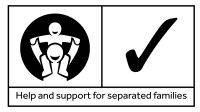It can be devastating to find that the relationship that you have had with your child’s mother is at an end. Your separation can often be accompanied by anger and mistrust. If you are not married, you may also be scared about the future and your relationship with your child. We look at some of the things that you will need to think about
Common law marriage
According to the British Social Attitudes survey, 51 per cent of people believe that cohabiting couples are protected by common law marriage. Sadly, this is a myth. There is no such legal status as common law marriage. This means that you need to think carefully about the choices you make.
Parental responsibilty
Parental responsibility (PR) is a legal status that means that you have a duty to care for and protect your child. It also gives you the right to make decisions regarding your child’s future such as:
- giving consent to medical treatment
- choosing their school
- deciding how they should be brought up
- choosing their name
- choosing their religion
PR is not automatically given to fathers, even where they are the biological father. It is vital that you check your status as soon as possible to see whether you have PR or not. If you don’t, then you must take steps immediately to get it. Read our article Parental responsibility: you and the law
Agreeing child arrangements
If you can agree who your children will mainly live with and how and when you will both see them, there is no need to ask the court to make an order. If you can’t agree, you may need to consider applying to the court for a child arrangements order. Either parent can apply for a child arrangements order for their child to live with them but you must have PR.
You may want to consider agreeing a parenting plan. This establishes how you and your child’s mum intend to make arrangements for your children after the separation.
Mediation: agreeing without the courts
The family courts: child arrangements order
Sorting out your housing
Agreeing who lives where is a critical decision that can affect your relationships with your children for years. Get advice before you make any serious moves, such as moving out of the home, or asking your child’s mother to leave.
If you decide to move out, it’s a good idea to find somewhere that your child(ren) can stay over night comfortably, and agree arrangements for when they stay with you/their mum before you move out.
The main choices that you have are buying a new home, renting privately or lodging although your choices may be limited by your financial position. If your child is going to live with you for most of the time, you may qualify to rent from your local authority or housing association.
Other things you might need to think about
There are likely to be a number of other practical considerations such as:
- child maintenance
- savings, pensions and benefits
- joint bank accounts and setting up new ones
- ongoing rent or mortgage payments
- childcare arrangements
childcare: what are the options?
- your work commitments
About the author
Clare Kirby qualified as a lawyer in 1983 and worked for several years in industry. She founded Kirby & Co in 1997. As a member of Resolution and an advanced member of the Law Society’s Family Law Panel she is experienced and respected in the field of family law. Trained as a collaborative lawyer, Clare offers clients a range of options – traditional, and collaborative law – to best meet the needs of the individual clients.
{loadposition article-advertise}








